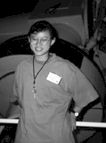Soojin Nam - optometry student
If you live in Australia and don't wear glasses or contact lenses, you're in the minority. Recent surveys have shown that glasses or contact lenses are worn by over half the Australian population.
For most of us, the ability to see clearly is essential for our work and daily lives. That's why so many people value their sight above the other four senses, and why optometry is such an important profession. By checking your eyes and prescribing glasses or contact lenses, optometrists help ensure the continued health of your eyes.
I chose to study optometry because I wanted to work in the medical field but not as a doctor. When I finish my Bachelor of Optometry degree, I can work as a clinical optometrist and do research.
Optometry has a lot to do with optical systems and the measurement of light and colour. My course includes units in psychology, physiology, pathology, microbiology and statistics. In the final year of the course, each student is placed with an optometrist for six weeks. I am hoping to work with an optometrist in India.
As well as studying, I am employed on a casual basis as an optometrist's receptionist, which is helping me discover first-hand what it is really like to practise as an optometrist.
During my last year of high school, I attended the National Science Summer School. It was inspiring, and so much fun that I now help run science schools for high school students myself. I also acted as a tour guide for competitors in the International Physics Olympiad when it was held recently in Canberra.
A science degree gives you the ability to solve problems, to be flexible in your ideas and to adapt to new environments.

This work is reproduced from the Women in Science Enquiry Network
PO Box 647 Glebe 2037,
http://www.usyd.edu.au/wisenet
"Science Futures" was produced by Wisenet with the aid of a grant from the Department of Industry, Science and Tourism Science and Technology Awareness Program.